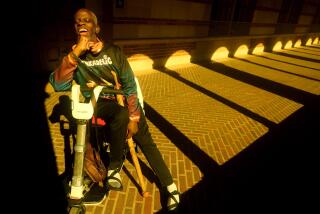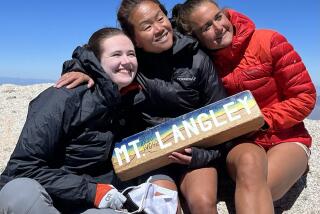Disabled Doctors Convene for Mutual Moral Support
With seven years of medical training behind her, Dr. Marla Bernbaum could afford a breather. After completing her medical residency at St. Louis University Hospital, she had only to pass a medical board exam and the rest would be smooth sailing.
But late in the summer of 1981, Bernbaum said, the inconceivable happened.
One day in August, her eyesight began to fade dramatically. A few hours later, Bernbaum was legally blind, the result of eye hemorrhages caused by diabetes she had had since childhood.
Almost immediately, Bernbaum decided to continue with her medical practice. âI didnât know what else to do,â she said.
She met obstacles in overprotective friends and associates doubtful of her future in medicine, but Bernbaum persevered. She passed the board exam with the help of a reader, took her place on the faculty at St. Louis University Medical School and established her own small but thriving practice--specializing in diabetes.
Bernbaumâs story is not as unusual as it seems. More than 65 physicians with handicaps ranging from hearing impairment to paralyzed limbs are attending the fourth annual convention of the American Society of Handicapped Physicians in Anaheim, and each has an inspirational story to tell.
More Than 1,000 Members
Membership in the society has increased from three doctors just four years ago to 1,064 currently, according to one of the societyâs founders, medical student Terry Winkler.
Winkler is firm about what handicapped individuals should do: define their own limits instead of letting others do it for them.
âWhen I first became paralyzed, people wanted me to play with handicrafts, to build model airplanes. The media did stories on handicapped people who painted with their mouths. Thatâs beautiful, thatâs real, I thought, but we can do something more,â he said
Winkler was paralyzed from the waist down at age 18 after a shooting accident. The future looked rocky. A high school dropout, his disability prevented him from returning to work in offshore oil drilling in Louisiana. The improbable desire to go to medical school nagged him.
Vocational counselors said he would never be accepted, so at Louisiana Tech University, he aimed for a career in an allied health field. âBut I kept thinking, these other people are going to be doctors. I was getting Aâs, but it still seemed impossible.â
Blind Doctor Partner
That thinking changed when Winkler met Spencer Lewis, a blind physician with a practice in Louisiana. Lewis filled Winkler with his feisty, unorthodox ideals.
âLewis thought handicapped people could be productive, and could even be doctors, the most productive members of society,â Winkler recalls.
They placed ads in 18 medical journals to contact other handicapped physicians. After receiving letters from all over the country, the two men organized the society.
The group supports aspiring doctors who must sometimes âclawâ their way into medical school, according to Winkler.
âI know an Iowa student who, despite good grades, was turned down from medical schools because he couldnât do cardiopulmonary resuscitation,â he said.
Even now, Bernbaum said, she must contend with skeptics. âThey keep saying Iâll go into psychiatry,â she laughs. And there are tough days when she takes a cab to work, relies on a backup physician to do skin checks and eye exams on patients, and then must wait for others to take her to the shoe repair shop.
âIt takes a lot of patience. Iâm still learning what I canât do. Or perhaps I should say Iâm still learning what I can do,â she said.
More to Read
Sign up for Essential California
The most important California stories and recommendations in your inbox every morning.
You may occasionally receive promotional content from the Los Angeles Times.










